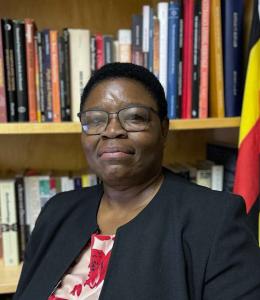
Dr Catherine Namono
African Fellow, December 2024 - January 2025
Home institution: University of the Witwatersrand
Ugandan scholar Catherine Namono is a Senior Lecturer in the School of Geography, Archaeology & Environmental Studies, University of the Witwatersrand, Johannesburg and currently Honorary Research Associate at the McDonald Institute for Archaeological Research, University of Cambridge. Catherine's research delves into the rich symbolism of rock art, derived from understanding the values, life-ways and visual ritual culture of Early farming communities, pastoralists, and Pygmy forest hunter-gatherers, across South and East Africa. She extends these understandings to consider how present communities provide new symbolism and meaning to the rock art. Catherine, is also engaged in community heritage tourism, reciprocity and conserving indigenous methodologies, and the (co)production of archaeological and heritage knowledge in archives/collections, perceiving social restitution in these contexts as (re)humanising material culture, cognisant of the complexities and contradictions they may highlight. She is inspired by critical de(re)colonial discourse that explores intersections of heritage management, community tourism and African epistemologies, that contribute to nuanced understandings of archaeology and heritage practices in Africa.
Project title: Digital rock art conservation applications for education and tourism (DRACET): Makgabeng community heritage tourism, Limpopo Province, South Africa project.
This project advances a cost-effective digital conservation strategy for the rock art sites of Makgabeng, South Africa. The initiative will generate high-quality digital models to support educational programs, sustainable tourism, and archaeological research to contextualize these culturally significant sites. The results will be important resources for schools and tourism initiatives, as well as scholarly research on the spatial distribution and historical context of Makgabeng’s rock art. A long-term conservation impact of the project will be knowledge and skills transfer to local community members regarding heritage monitoring amidst increasing threats by regional mining activities. This project will be enriched through collaboration with the University of Edinburgh's research and data groups; and the possible co-curation of Ugandan cultural heritage within the University of Edinburgh’s heritage collections and the National Museum of Scotland.
